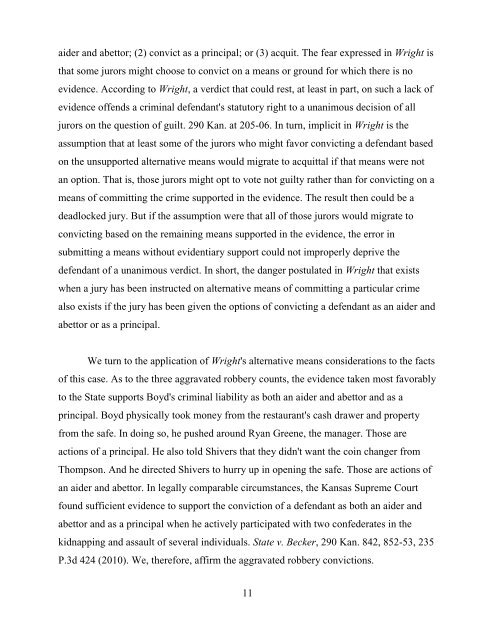Kansas Court of Appeals - 104282 â State v. Boyd
Kansas Court of Appeals - 104282 â State v. Boyd
Kansas Court of Appeals - 104282 â State v. Boyd
Create successful ePaper yourself
Turn your PDF publications into a flip-book with our unique Google optimized e-Paper software.
aider and abettor; (2) convict as a principal; or (3) acquit. The fear expressed in Wright is<br />
that some jurors might choose to convict on a means or ground for which there is no<br />
evidence. According to Wright, a verdict that could rest, at least in part, on such a lack <strong>of</strong><br />
evidence <strong>of</strong>fends a criminal defendant's statutory right to a unanimous decision <strong>of</strong> all<br />
jurors on the question <strong>of</strong> guilt. 290 Kan. at 205-06. In turn, implicit in Wright is the<br />
assumption that at least some <strong>of</strong> the jurors who might favor convicting a defendant based<br />
on the unsupported alternative means would migrate to acquittal if that means were not<br />
an option. That is, those jurors might opt to vote not guilty rather than for convicting on a<br />
means <strong>of</strong> committing the crime supported in the evidence. The result then could be a<br />
deadlocked jury. But if the assumption were that all <strong>of</strong> those jurors would migrate to<br />
convicting based on the remaining means supported in the evidence, the error in<br />
submitting a means without evidentiary support could not improperly deprive the<br />
defendant <strong>of</strong> a unanimous verdict. In short, the danger postulated in Wright that exists<br />
when a jury has been instructed on alternative means <strong>of</strong> committing a particular crime<br />
also exists if the jury has been given the options <strong>of</strong> convicting a defendant as an aider and<br />
abettor or as a principal.<br />
We turn to the application <strong>of</strong> Wright's alternative means considerations to the facts<br />
<strong>of</strong> this case. As to the three aggravated robbery counts, the evidence taken most favorably<br />
to the <strong>State</strong> supports <strong>Boyd</strong>'s criminal liability as both an aider and abettor and as a<br />
principal. <strong>Boyd</strong> physically took money from the restaurant's cash drawer and property<br />
from the safe. In doing so, he pushed around Ryan Greene, the manager. Those are<br />
actions <strong>of</strong> a principal. He also told Shivers that they didn't want the coin changer from<br />
Thompson. And he directed Shivers to hurry up in opening the safe. Those are actions <strong>of</strong><br />
an aider and abettor. In legally comparable circumstances, the <strong>Kansas</strong> Supreme <strong>Court</strong><br />
found sufficient evidence to support the conviction <strong>of</strong> a defendant as both an aider and<br />
abettor and as a principal when he actively participated with two confederates in the<br />
kidnapping and assault <strong>of</strong> several individuals. <strong>State</strong> v. Becker, 290 Kan. 842, 852-53, 235<br />
P.3d 424 (2010). We, therefore, affirm the aggravated robbery convictions.<br />
11
















